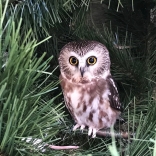Covering Ground
 Review: "Eager: The Surprising, Secret Life of Beavers"
Review: "Eager: The Surprising, Secret Life of Beavers"
I live in a coastal town with abundant freshwater wetlands that drain to Long Island Sound. Beavers live here, too, and given their penchant for taking down ornamental trees and flooding driveways, their presence is not without controversy.
 Book Review: The Wizard And The Prophet
Book Review: The Wizard And The Prophet
If you find the tornado of information about climate change, species extinction, carbon capture, and ways to save the planet more than a bit dizzying, it sometimes helps to get grounded in history. The Wizard and The Prophet takes us back a century to times when many of these discussions began.
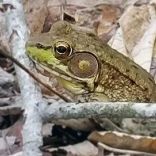 Consider these little green critters; they do big things.
Consider these little green critters; they do big things.
They weigh less than a pound, in most cases much less, and they make few sounds. Yet frogs, toads, salamanders, turtles, and snakes have a big presence in the landscape.
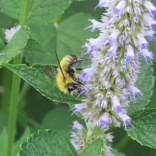 Flowers for the Queen (Bee)
Flowers for the Queen (Bee)
Don’t mistake their small size for lack of importance in our quality of life. Queen bumblebees are among the earliest insects to emerge in our area, and their pollinating activity is critical to both them and us.
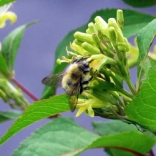 Slow down to see spring's ephemeral flowers
Slow down to see spring's ephemeral flowers
Big bursts of yellow forsythia call out to us in late April, like billboards for spring, easy to see as we fly by in cars, trains, or on bicycles.
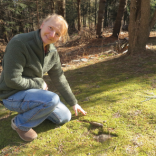 Grow Moss in Winter
Grow Moss in Winter
If I told you there’s something green sparkling in the February sunlight just outside your door, you might be tempted to take a look. Don’t be disappointed if all you find is moss. It sometimes pays to notice the familiar.
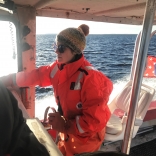 Down on the (Kelp) Farm in Fisher's Island Sound
Down on the (Kelp) Farm in Fisher's Island Sound
Suzie Flores had no professional farming or maritime experience before 2016. Then her husband, a veteran of the U.S. Marines, purchased the Mechanic Street Marina on the Pawcatuck River in Pawcatuck. He’d been around boats all his life, but was not a farmer.
 Master Gardener Program Turns 40
Master Gardener Program Turns 40
Perhaps you know someone you consider a master gardener, someone whose skill with plants and flowers is far above average.
 Book Review: The Triumph of Seeds by Thor Hanson
Book Review: The Triumph of Seeds by Thor Hanson
How did grains, nuts, kernels, pulses, and pips conquer the plant kingdom and shape human history? If you find the question intriguing, you'll find some answers in this thoughtful look at the multiple ways societies interact with plants and seeds. As science reading goes, it is easy to follow.

